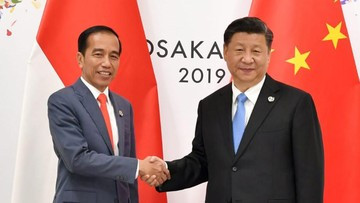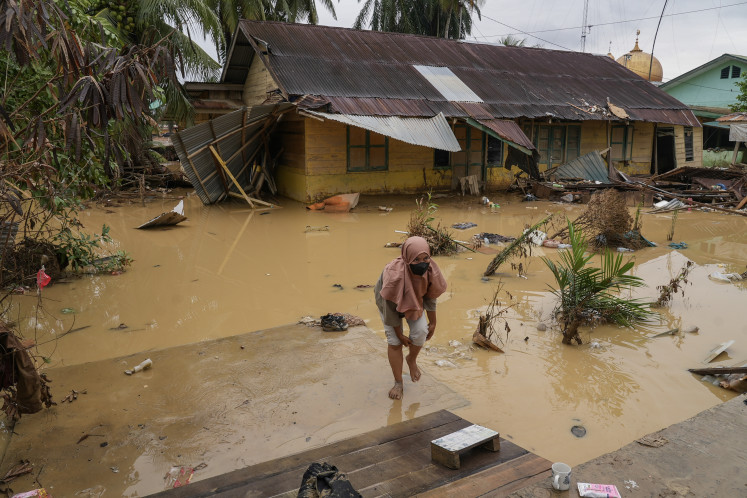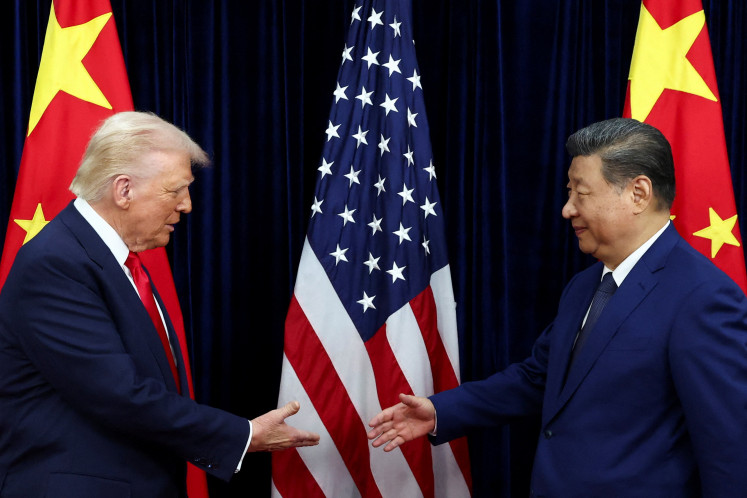Popular Reads
Top Results
Can't find what you're looking for?
View all search resultsPopular Reads
Top Results
Can't find what you're looking for?
View all search resultsChina’s foreign policy: Xi Jinping thought on diplomacy
A question of common interest thus emerges: Where is China’s foreign policy heading and what is it aiming for?
Change text size
Gift Premium Articles
to Anyone
C
hina has increasingly become the center of attention on the world stage in recent years. In my decades-long interactions with friends and colleagues from the ASEAN family, I could always find heart-warming friendliness but also uncertainty about China from time to time, which is, unfortunately, exacerbated recently by the misleading smearing of China by a few Western politicians.
A question of common interest thus emerges: Where is China’s foreign policy heading and what is it aiming for?
The Xi Jinping Thought on Diplomacy doctrine would be the most authoritative answer to this question. Since the 18th National Congress of the Communist Party of China (CPC), the CPC Central Committee with Comrade Xi Jinping at its core has put forward a series of new ideas, new propositions and new initiatives, pointing the direction and providing fundamental guidance for China’s foreign policy.
China is committed to building a community with a shared future for mankind, which is the essence of Xi Jinping Thought on Diplomacy.
President Xi points out, “Humankind, by living in the same global village within the same time and space where history and reality meet, has increasingly emerged as an intimate community of shared future. No country could meet the challenges for mankind alone.”
The foresight of this vision is once again proved to be true in the ongoing COVID-19 pandemic.
To build a community with a shared future for mankind is the goal of China’s foreign policy. Toward this end, China has been working hard all along, and the most recent effort would be our engagement in international cooperation against COVID-19. As far as ASEAN is concerned, China provided COVID-19-related information in a timely manner, shared experience in control and treatment, and offered a large number of medical supplies.
The revival of the regional economy as soon as possible presents another daunting challenge of the day. China has opened or is planning to open “fast-track lanes” for essential personnel exchanges and “green channels” for cargo transportation with Singapore, Myanmar, Indonesia and Malaysia. China and ASEAN countries are also jointly working on COVID-19 vaccine research and development, as well as production. It’s good to know that phase III clinical trials of a vaccine developed in China was rolled out in Indonesia days ago.
China is committed to the path of peaceful development. There are people in the West who apply the “Thucydides Trap” or “Kindleberger Trap” to interpret China’s rapid development. Trapped in the belief that “a strong country must seek hegemony”, they demonize China as a potential danger to the world.
On the contrary, the Chinese culture holds dear harmony and unity; harmony being the most valuable and harmony without uniformity. Invasion and hegemony-seeking have never been in the Chinese DNA. Facts still speak louder than words. For instance, China’s military expenditure was an average of 1.3 percent of gross domestic product (GDP) in the last 10 years, lower than the world average.
China has always been dedicated to resolving disputes through negotiations in peace while safeguarding China’s territorial sovereignty and maritime rights and interests. Guided by the Five Principles of Peaceful Coexistence and the spirit of fostering amity and friendship with neighbors, China has properly solved most of the leftover boundary issues step by step with neighboring countries in the past seven decades, and the delineated boundary is about 90 percent of China’s total boundary on land.
Regarding disputes over the South China Sea, China remains committed to the “dual-track” approach of resolving disputes peacefully through consultation and negotiation between countries directly concerned and of upholding peace and stability in the South China Sea by China and ASEAN countries through joint efforts, including regional rules-making.
In 2013, President Xi put forward the major initiatives of the Silk Road Economic Belt and the 21st Century Maritime Silk Road, which later turned into the Belt and Road Initiative (BRI). It focuses on economic cooperation, rather than geopolitical alliance. It is open and inclusive and rests upon extensive consultation, joint contribution and shared benefits.
Six years on, the initiative is materializing and has become one of the most popular global public goods. It is exciting to see flourishing BRI cooperation between China and ASEAN countries in infrastructure, energy, manufacturing, industrial parks and more. Such cooperation has already delivered real dividends to local development and people.
Populism, protectionism, unilateralism and antiglobalization sentiments are proliferating now. Certain countries attribute their domestic problems to external shocks, claiming that they have been “taken advantage of ” in the existing trading system. They adopt various measures, including trade, to suppress the development of others, even willfully withdrawing from international treaties and organizations and scapegoating others. Their behavior has seriously violated the multilateral trading system.
Yet despite this, as a firm defender of economic globalization and multilateral trading system, China continues to promote trade and investment liberalization and facilitation, a fair, equitable and transparent system of international economic and trading rules, as well as a more open, connected and integrated global economy.
The existing international system was established after World War II under the leadership of United States-led Western countries. Despite its deficiencies and drawbacks, it has played an important role in maintaining world peace and development over the past 70 years. The purpose of reforming the current international system is not to overturn it and start anew, but to adjust and improve it within the overall framework and to make it better adapted to the evolved international landscape.
China firmly safeguards the core role of the United Nations in global governance and promotes the building of a more just and equitable international governance system. China honors its commitments on global issues such as climate change by staying on course of green, low-carbon and sustainable development.
China will do well only when the world does well and vice versa. On our way toward a community with a shared future, China will work together with ASEAN countries and all other countries in the world to eradicate poverty and seek prosperity and development, to end conflicts and uphold peace, and to bridge the gap between civilizations through exchanges and mutual learning. Together we march toward a better world for all!
---
Ambassador of the People’s Republic of China to ASEAN










